英汉双语版《傲慢与偏见》第十一章节选
经典名著英汉互译:傲慢与偏见(节选)

经典名著英汉互译:傲慢与偏见(节选)This was enough to prove that her approbation need not be doubted: and Elizabeth, rejoicing that such an effusion was heard only by herself, soon went away. But before she hadbeen three minutes in her own room, her,other followed her.这番话足以表明她已完全同意了这门婚事。
令伊丽莎白欣慰的是,只有她一人听见了母亲那些得意忘形的话,然后她便回到自己的房间里,可不到三分钟,母亲又跟来了。
"My dearest child," she cried,“I can think of nothingelse! Ten thousand a year, and very likely more! Tis as goodas a Lord! And a special licence. You must and shall be married by a special licence. But my dearest love,tell me what dish Mr. Darcy is particularly fond of, that I may haveit tomorrow."“我的宝贝,”母亲大声叫道,“我真的什么也不奢求了!每年有一万镑的收入,还可能比这更多!啊,富比王侯啊,而且还有特许结婚证!你必须要用特许结婚证结婚。
不过,我的心肝儿,告诉妈妈,达西先生最爱吃什么菜,我明天好准备啊。
”This was a sad omen of what her mother's behaviour to the gentleman himself might be;and Elizabeth found that, thoughin the certain possession of his warmest affection,andsecure of her relations’consent, there was still somethingto be wished for. But the morrow passed off much better than she expected; for Mrs. Bennet luckily stood in such awe ofher intended son-in-law that she ventured not to speak to him, unless it was in her power to offer him any attention,ormark her deference for his opinion.这句话可不是什么好兆头啊,不知道明天母亲要在那位先生面前做出什么样的事来;伊丽莎白心想,现在虽然已经确切地得到了他最热烈的爱,而且家里人也都同意了,但仍然有些美中不足。
《傲慢与偏见》经典中英对照语录

《傲慢与偏见》经典中英对照语录1、It is a truth universally acknowledged,that a single man in possession of a good fortune must be in want of a wife.有钱的单身汉总要娶位太太,这是一条举世公认的真理。
跟一个人相处了两个星期,不可能就此理解他终究是怎样一个人。
不过,要是我们不去尝试尝试,别人可少不了要尝试的。
假设一个女人爱上了一个男人,只要女方不成心瞒住男方,男方一定会看得出的。
4、Perhaps that is not possible for any one. But it has been the study of my life to avoid those weaknesses which often expose a strong understanding to ridicule.Such as vanity and pride.或许谁都还会有这些弱点,否那么可真糟了,绝顶的聪明也要招人嘲笑了。
我一生都在研究该怎么样防止这些弱点。
例如虚荣和傲慢就是属于这一类弱点。
5、 My good opinion once lost is lost for ever.我对于某个人一旦没有了好感,就永远没有好感。
我,相信一个人不管是怎样的脾气,都免不了有某种短处,这是一种天生的缺陷,即使受教育受得再好,也还是克制不了。
有些人即使没有存心做坏事,可事实上事情仍会做错,引起不幸的后果。
但凡粗心大意、看不出别人的好心好意,而且缺乏果断的人,都一样能害人。
假装谦虚往往就是信口开河,有时候简直是拐弯抹角的自夸。
9、Married life is happiness, pletely is a chance to question.婚姻生活是否幸福,完全是个时机问题。
10、A pair of lovers premarital understand each other well or character special similar, this does not mean that after their marriage can be happy. They are often get later distance farther and farther, each other troubles. Since you have with this person for life, to his faults know as little as possible.一对爱人婚前彼此非常理解或性格特别相似,这并不能说明他们婚后会幸福。
【2019最新】英文名著精选阅读:《傲慢与偏见》第11章 第5节-word范文模板 (1页)
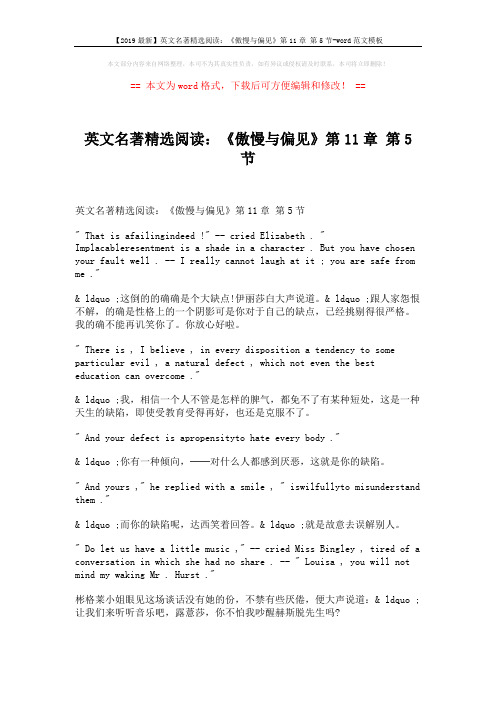
【2019最新】英文名著精选阅读:《傲慢与偏见》第11章第5节-word范文模板本文部分内容来自网络整理,本司不为其真实性负责,如有异议或侵权请及时联系,本司将立即删除!== 本文为word格式,下载后可方便编辑和修改! ==英文名著精选阅读:《傲慢与偏见》第11章第5节英文名著精选阅读:《傲慢与偏见》第11章第5节" That is afailingindeed !" -- cried Elizabeth . " Implacableresentment is a shade in a character . But you have chosen your fault well . -- I really cannot laugh at it ; you are safe from me ."& ldquo ;这倒的的确确是个大缺点!伊丽莎白大声说道。
& ldquo ;跟人家怨恨不解,的确是性格上的一个阴影可是你对于自己的缺点,已经挑剔得很严格。
我的确不能再讥笑你了。
你放心好啦。
" There is , I believe , in every disposition a tendency to some particular evil , a natural defect , which not even the best education can overcome ."& ldquo ;我,相信一个人不管是怎样的脾气,都免不了有某种短处,这是一种天生的缺陷,即使受教育受得再好,也还是克服不了。
" And your defect is apropensityto hate every body ."& ldquo ;你有一种倾向,──对什么人都感到厌恶,这就是你的缺陷。
" And yours ," he replied with a smile , " iswilfullyto misunderstand them ."& ldquo ;而你的缺陷呢,达西笑着回答。
傲慢与偏见中英逐行对照珍藏
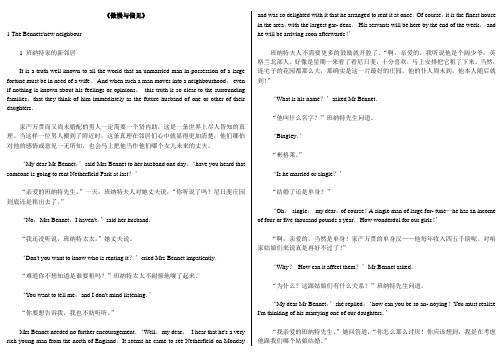
《傲慢与偏见》1 The Bennets'new neighbour1 班纳特家的新邻居It is a truth well known to all the world that an unmarried man in possession of a large fortune must be in need of a wife.And when such a man moves into a neighbourhood,even if nothing is known about his feelings or opinions,this truth is so clear to the surrounding families,that they think of him immediately as the future husband of one or other of their daughters.家产万贯而又尚未婚配的男人一定需要一个贤内助,这是一条世界上尽人皆知的真理。
当这样一位男人搬到了附近时,这条真理在邻居们心中就显得更加清楚,他们哪怕对他的感情或意见一无所知,也会马上把他当作他们哪个女儿未来的丈夫。
‘My dear Mr Bennet,’said Mrs Bennet to her husband one day,‘have you heard that someone is going to rent Netherfield Park at last?’“亲爱的班纳特先生,”一天,班纳特夫人对她丈夫说,“你听说了吗?尼日斐庄园到底还是租出去了。
”‘No,Mrs Bennet,I haven't,’said her husband.“我还没听说,班纳特太太,”她丈夫说。
‘Don't you want to know who is renting it?’cried Mrs Bennet impatiently.“难道你不想知道是谁要租吗?”班纳特太太不耐烦地嚷了起来。
【名著导读】《傲慢与偏见》每章内容概括
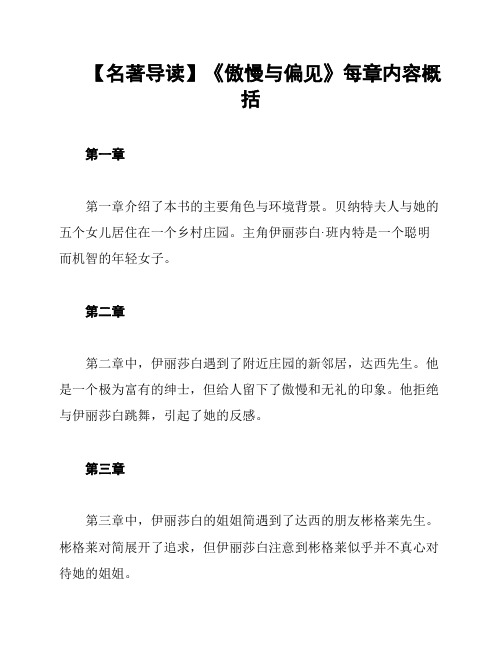
【名著导读】《傲慢与偏见》每章内容概括第一章第一章介绍了本书的主要角色与环境背景。
贝纳特夫人与她的五个女儿居住在一个乡村庄园。
主角伊丽莎白·班内特是一个聪明而机智的年轻女子。
第二章第二章中,伊丽莎白遇到了附近庄园的新邻居,达西先生。
他是一个极为富有的绅士,但给人留下了傲慢和无礼的印象。
他拒绝与伊丽莎白跳舞,引起了她的反感。
第三章第三章中,伊丽莎白的姐姐简遇到了达西的朋友彬格莱先生。
彬格莱对简展开了追求,但伊丽莎白注意到彬格莱似乎并不真心对待她的姐姐。
第四章第四章中,伊丽莎白参加了一个舞会,在那里她再次与达西相遇。
达西试图向伊丽莎白解释他之前的行为,但她仍然对他感到愤怒。
第五章第五章中,贝纳特夫人听说卧槽先生,一个富有的绅士,可能会租赁附近的庄园。
她希望能够将其中一位女儿与他结婚,以便改善整个家庭的财务状况。
第六章第六章中,伊丽莎白和她的表姐琼迪聚会并讨论了他们对婚姻的观点。
琼迪告诉伊丽莎白,她相信婚姻应该建立在真爱的基础上,而不是出于财务或社会地位的考虑。
第七章第七章中,贝纳特夫人的一位远亲,柯林先生,来到庄园拜访。
他有意与贝纳特夫人其中一位女儿结婚,但伊丽莎白决定不嫁给他,因为他显得极其无趣和自大。
第八章第八章中,达西先生突然向伊丽莎白求婚,但遭到了她的拒绝。
伊丽莎白指责他傲慢和不道德,并对他表示极度的失望。
第九章第九章中,伊丽莎白接受了邀请,前往兰姆顿庄园与她的朋友夏洛特·卢卡斯度假。
在那里,她再次遇到了达西,并通过他的信件了解了他的真实情感。
第十章第十章中,伊丽莎白与达西相互表达了他们的感情,并最终决定结婚。
伊丽莎白的家人对这个决定感到惊讶,但他们接受了这个事实。
第十一章第十一章中,伊丽莎白拜访了达西的家人,与他们建立了更亲密的关系。
她发现他们迥然不同于她一开始对达西家庭的偏见。
第十二章第十二章中,达西的姐姐乔治安娜和她的未婚夫彬登希望结婚。
然而,达西的舅舅和堂弟曼斯菲尔德先生不同意这段婚姻,因为彬登的社会地位不够高贵。
傲慢与偏见(Pride and Prejudice)中英文对照

..that the whole party will have left Netherfield by now, for London.
And without any intention of coming back again.
而且不打算再回来
(MISS BINGLEY): Charles first thought that his business in London Would only take a feW days,
傲慢与偏见 Pride and Prejudice BBC版本 中英文剧本3
Lizzy! Jane!
丽西,瑾
What do you think? Mr Collins has made an offer of marriage to Charlotte Lucas!
你们说呢? 科林斯先生 跟夏洛蒂洛克斯求婚了
但她无法说服坠入情网的人 相信自己爱的是别人
If Bingley is not back by your side and dining at Longbourn within two weeks,
若宾莱先生两周内 没回你身边到龙柏园晚餐
I shall be very much surprised.
我衷心渴望这一件 会让许多人都幸福的事
in indulging the hope of an event Which Would secure the happiness of so many?
Is it not clear enough?
这还不够清楚吗?
Caroline Bingley believes her brother is indifferent to me and she means to put me on my guard.
英美文学欣赏第四版傲慢与偏见课文翻译

英美文学欣赏第四版傲慢与偏见课文翻译When Jane and Elizabeth were alone, the former, who had been cautious in her praise of Mr. Bingley before, expressed to her sister just how very much she admired him."He is just what a young man ought to be," said she, "sensible, good hum red, lively; and I never saw such happy manners!—so much ease,with such perfect good breeding!""He is also handsome," replied Elizabeth, "which a young man ought likewise to be, if he possibly can. His character is thereby complete.""I was very much flattered by his asking me to dance a second time. I did not expect such a compliment.""Did not you? I did for you. But that is one great difference between us. Compliments always take you by surprise, and me never. What could be more natural than his asking you again? He could not help seeing that you were about five times as pretty as every other woman in the room. No thanks to his gallantry for that. Well, he certainly is very agreeable, and I give you leaveto like him. Youhave liked many a stupider person.""Dear Lizzy!""Oh! you are a great deal too apt【易于...的】,you know, to like people in general. You never see a fault in anybody. All the world are good and agreeable in your eyes. I never heard you speak ill of 【说...坏话】a human being in your life.""I would not wish to be hasty in censuring【指责】 anyone; but I always speak what I think.""I know you do; and it is that which makes the wonder. With your good sense, to be so honestly blind to the follies and nonsense of others! Affectation 【假装】of candour【坦诚】is common enough—one meets with it everywhere. But to be candid【坦率的】without ostentation【卖弄】or design—to take the good of everybody's character and make it still better, and say nothing of the bad—belongs to you alone. And so you like this man's sisters, too, do you? Their manners are not equal to his.""Certainly not—at first. But they are very pleasing women when you converse with them. Miss Bingley is to live with her brother, and keep his house; and I am much mistaken if we shall not find a verycharming neighbour in her."Elizabeth listened in silence, but was not convinced; their behaviour at the assembly had not been calculated to please in general; and with more quickness of observation and less pliancy 【柔软,柔顺】of temper than her sister, and with a judgement too unassailed by any attention to herself, she was very little disposed to 【易于...,对比前面的apt to】approve them. They were in fact very fine ladies; not deficient in【缺乏...】good humour when they were pleased, nor in the power of making themselves agreeable when they chose it, but proud and conceited【自负的】. They were rather handsome, had been educated in one of the first private seminaries in town, had a fortune of twenty thousand pounds, were in the habit of spending more than they ought, and of associating with people of rank【有身份地位的人】, and were therefore in every respect entitled to think well of themselves, and meanly of others. They were of a respectable family in the north of England; a circumstance more deeply impressed on their memories than that their brother's fortune and their own had been acquired by trade.【more...than...句式中,肯定“more”后面的内容而否定“than”后面的,相当于“是……而不是……”,写作里非常实用。
《傲慢与偏见》英译本对比

文学名著(《傲慢与偏见》)的中文翻译版本阅读笔记0948407 檀芬《傲慢与偏见》是英国现实主义女作家简·奥斯汀(1775-1817)的代表作,该小说写于18世纪90年代,虽然经历了两个世纪的阅读与批评,但社会阅读兴趣却始终长盛不衰,其艺术魅力倾倒了一代又一代读者,影响着一代代作家。
小说以伊丽莎白与达西的爱情为主线,讲述了伊丽莎白与达西、简与宾利、迪亚与威克姆、夏洛蒂与柯林斯这四桩婚姻,深刻揭露了物质因素在婚姻关系中所起的决定性作用。
小说情节错综复杂,引人入胜;人物刻画惟妙惟肖,形象逼真。
在这部富于喜剧色彩的现实主义世态小说中,奥斯汀的嘲讽渗透于字里行间,成为小说的灵魂。
目前至少已有12个译本出版,其中流传最广的译本有两种,一种是50年代王科一的译本,另一种是80年代末孙致礼的译本。
王科一(1925--1968),文学翻译家。
安徽太平(今黄山)人。
1952年毕业于复旦大学英国文学系。
先后任上海文艺联合出版社、新文艺出版社、人民文学出版社上海分社编辑。
中国民主同盟盟员。
翻译作品主要有:《伊斯兰的起义》、《傲慢与偏见》、《远大前程》、《海华沙之歌》、《十日谈》等。
孙致礼教授是中国人民解放军外国语学院博士生导师,专业技术三级,我国著名翻译家及翻译理论家,中国翻译工作者协会理事、翻译理论和教学研究委员会会员、全国英汉语比较研究会常务理事、首届军队院校育才奖“金奖”获得者。
孙教授翻译出版经典文学名著30余部,出版专著2部,编著英汉翻译教材1部,主持完成国家社会科学基金项目两项,发表学术论文60多篇,共计约600万字。
孙教授的翻译实践和理论研究在我国翻译界享有极高的威望和声誉。
两个译本流传至今,各有其独到、吸引人之处。
由于译者处于不同的时代,各自的翻译、语言风格不尽相同,若我们细看,可以看到一些译者翻译的不同之处。
两个译本在篇章上有一个很明显的不同。
原著中共61章(chapter 1--chapter 61),孙译本:第一卷(第一章至第二十三章),第二卷(第二十四章至第四十二章),第三卷(第四十三章至第六十一章);王译本则是与原著相一致从第一章至第六十一章。
英文阅读–傲慢与偏见

Disguise(v.)
to give a new appearance to a person or thing, especially in order to hide its true form
假扮
Sort(n.)
a person having the stated or suggested character
企圖
Evident(adj.)
easily seen or understood; obvious
明顯的
Offend(v.)
to make someone upset or angry
冒犯
Insult(v.)
to say or do something to someone that is rude or offensive
the act or fact of appearing
出現;顯露
imagine
to think, believe, or fancy
想像
kilometre
a unit of length
千米,公里
ankle
the joint between the foot and the leg, in which movement occurs in two planes.
贊同的
Tempt(v.)
to make someone want to have or do something, especially something that is unnecessary or wrong
吸引
Interrupt(v.)
to stop a person from speaking for a short period by something you say or do, or to stop something from happening for a short period
英汉双语版《傲慢与偏见》第十一章节选
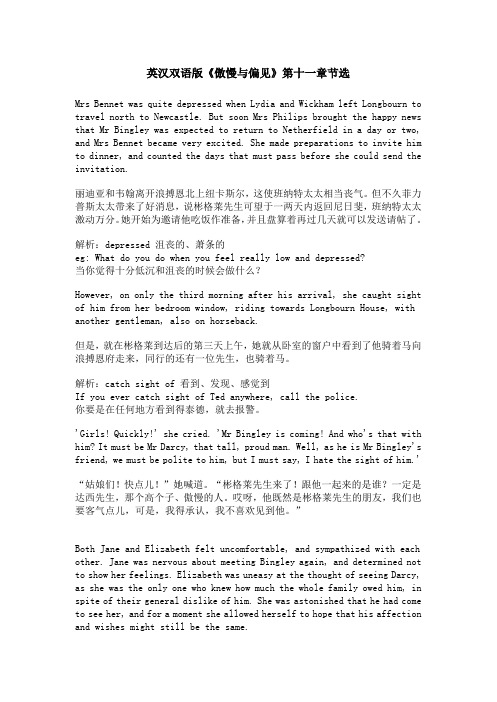
英汉双语版《傲慢与偏见》第十一章节选Mrs Bennet was quite depressed when Lydia and Wickham left Longbourn to travel north to Newcastle. But soon Mrs Philips brought the happy news that Mr Bingley was expected to return to Netherfield in a day or two, and Mrs Bennet became very excited. She made preparations to invite him to dinner, and counted the days that must pass before she could send the invitation.丽迪亚和韦翰离开浪搏恩北上纽卡斯尔,这使班纳特太太相当丧气。
但不久菲力普斯太太带来了好消息,说彬格莱先生可望于一两天内返回尼日斐,班纳特太太激动万分。
她开始为邀请他吃饭作准备,并且盘算着再过几天就可以发送请帖了。
解析:depressed 沮丧的、萧条的eg: What do you do when you feel really low and depressed?当你觉得十分低沉和沮丧的时候会做什么?However, on only the third morning after his arrival, she caught sight of him from her bedroom window, riding towards Longbourn House, with another gentleman, also on horseback.但是,就在彬格莱到达后的第三天上午,她就从卧室的窗户中看到了他骑着马向浪搏恩府走来,同行的还有一位先生,也骑着马。
傲慢与偏见中英文对照

傲慢与偏见中英文对照傲慢与偏见是英国作家简·奥斯汀的经典小说,被誉为英国文学的珍品之一。
以下是一些经典语句的中英文对照。
1. “It is a truth universally acknowledged, that a single man in possession of a good fortune, must be in want of a wife.”众所周知,一个有钱的单身汉一定需要一个妻子。
2. “I have been used to consider poetry as the food of love.”我一直认为诗歌是爱情的食粮。
3. “Angry people are not always wise.”愤怒的人并不总是明智的。
4. “I cannot fix on the hour, or the spot, or the look, or the words, which laid the foundation. It is too long ago.I was in the middle before I knew that I had begun.”我无法确定是哪个时刻、哪个地点、哪个表情或者哪段话奠定了基础,太久以前了。
我开始前并不知道自己已经开始了。
5. “It is happy for you that you possess the talent of flattering with delicacy. May I ask whether these pleasing attentions proceed from the impulse of the moment, or are they the result of previous study?”你拥有巧妙恭维的天赋,这对你来说是一种幸福。
我可以问一下,这些令人愉快的关注是来自一时兴起的冲动,还是前期的研究成果? 6. “I have faults enough, but they are not, I hope, ofunderstanding. My temper I dare not vouch for. It is, I believe, too little yielding— certainly too little for the convenience of the world. I cannot forget the follies and vices of other so soon as I ought, nor their offenses against myself.”我有足够的缺点,但我希望它们不是智力上的问题。
傲慢与偏见英文精读
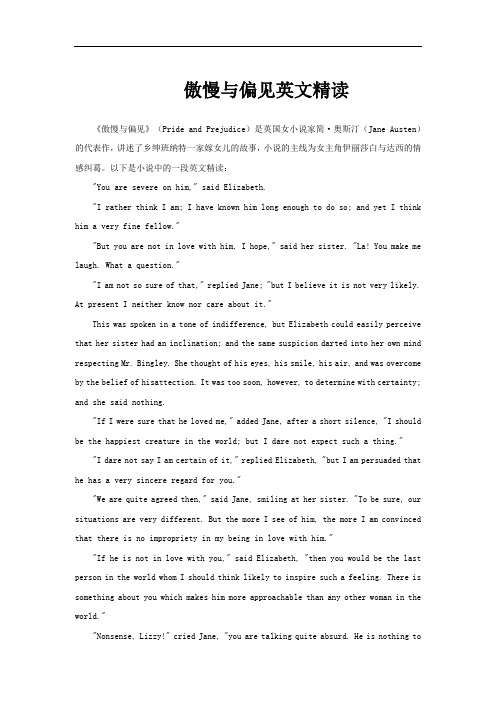
傲慢与偏见英文精读《傲慢与偏见》(Pride and Prejudice)是英国女小说家简·奥斯汀(Jane Austen)的代表作,讲述了乡绅班纳特一家嫁女儿的故事,小说的主线为女主角伊丽莎白与达西的情感纠葛。
以下是小说中的一段英文精读:"You are severe on him," said Elizabeth."I rather think I am; I have known him long enough to do so; and yet I think him a very fine fellow.""But you are not in love with him, I hope," said her sister. "La! You make me laugh. What a question.""I am not so sure of that," replied Jane; "but I believe it is not very likely. At present I neither know nor care about it."This was spoken in a tone of indifference, but Elizabeth could easily perceive that her sister had an inclination; and the same suspicion darted into her own mind respecting Mr. Bingley. She thought of his eyes, his smile, his air, and was overcome by the belief of hisattection. It was too soon, however, to determine with certainty; and she said nothing."If I were sure that he loved me," added Jane, after a short silence, "I should be the happiest creature in the world; but I dare not expect such a thing.""I dare not say I am certain of it," replied Elizabeth, "but I am persuaded that he has a very sincere regard for you.""We are quite agreed then," said Jane, smiling at her sister. "To be sure, our situations are very different. But the more I see of him, the more I am convinced that there is no impropriety in my being in love with him.""If he is not in love with you," said Elizabeth, "then you would be the last person in the world whom I should think likely to inspire such a feeling. There is something about you which makes him more approachable than any other woman in the world.""Nonsense, Lizzy!" cried Jane, "you are talking quite absurd. He is nothing tome farther than a common acquaintance. Why should he be in love with me? And even if he were, why should I wish to marry him?""Because you are in love。
傲慢与偏见每章总结英文

傲慢与偏见每章总结英文Chapter 1: Mr. Bennet receives news that a wealthy bachelor, Mr. Bingley, has rented a nearby estate. Mrs. Bennet eagerly hopes that one of her daughters will marry him. Mr. Bennet is skeptical.Chapter 2: Mr. Bingley attends a local ball and is immediately the center of attention. He is found to be amiable and good-looking. Jane, the oldest Bennet sister, catches his eye, while his friend Mr. Darcy offends everyone with his aloofness.Chapter 3: Mr. Bingley's affection for Jane becomes evident, much to the delight of Mrs. Bennet. Mr. Darcy continues to dismiss the local society. Elizabeth, the second Bennet daughter, overhears his rude comments about her and forms a dislike towards him. Chapter 4: The Bennet girls visit their new neighbor, Mr. Bingley. Jane becomes even more enamored with him, while Elizabeth becomes more convinced of Mr. Darcy's pride and arrogance.Chapter 5: Jane receives a visit from Miss Bingley, Mr. Bingley's sister, who tries to create distance between her and Mr. Bingley. Meanwhile, Elizabeth grows closer to Mr. Wickham, a charming officer in the militia, who shares his grievances against Mr. Darcy. Chapter 6: The Bennet family attends a local ball, where Mr. Darcy's feelings towards Elizabeth begin to change. However, she remains stubborn in her dislike towards him.Chapter 7: Jane is invited to visit the Bingleys at their London home, much to Mrs. Bennet's joy. Elizabeth accompanies her andis invited to stay with their aunt and uncle, the Gardiners. Mr. Darcy unexpectedly appears in London.Chapter 8: Elizabeth visits the Gardiners and explores London with them. She accidentally encounters Mr. Darcy at Pemberley, his grand estate, where he surprises her with his amiable and gracious behavior.Chapter 9: Elizabeth receives a letter from Jane, informing her that Lydia, the youngest Bennet sister, has run off with Mr. Wickham. The family is in distress, and Elizabeth feels responsible for not having revealed Mr. Wickham's true character.Chapter 10: Mr. Bennet leaves to search for Lydia, while the rest of the family is left to worry about her situation. Mr. Darcy quickly acts and arranges for Lydia and Wickham's marriage, saving the Bennet family from disgrace.Chapter 11: Lydia returns home as a married woman but lacks any sense of shame or responsibility. The Bennet family receives an invitation to visit Mr. Bingley at Netherfield, much to Mrs. Bennet's excitement.Chapter 12: Elizabeth is surprised to see Mr. Darcy again at Netherfield and realizes that her feelings towards him might be changing. She observes his kindness towards her and her family, and is determined to apologize for her previous prejudice. Chapter 13: The Bennet family enjoys their time at Netherfield, but soon learns that their visit has been cut short due to the suddendeparture of Mr. Bingley and Mr. Darcy. Elizabeth is confused and heartbroken, believing that Mr. Darcy influenced Mr. Bingley to leave.Chapter 14: The Bennet family faces financial troubles as Mr. Collins, their distant cousin and heir to their home, proposes to Elizabeth. She rejects him, much to the dismay of her mother. Meanwhile, Mr. Darcy visits Elizabeth, expressing his intense love for her.Chapter 15: Elizabeth confronts Mr. Darcy about his interference in Jane and Bingley's relationship, causing him to reveal his reasons - he believed Jane did not reciprocate Bingley's feelings. Elizabeth refuses to believe him, further distancing herself from Mr. Darcy.Chapter 16: Elizabeth travels with her aunt and uncle to visit Pemberley, Mr. Darcy's estate. She encounters him unexpectedly, and their interaction is less awkward. She begins to realize the strength of her feelings for him.Chapter 17: Mr. Darcy introduces Elizabeth to his sister, Georgiana, and Elizabeth is impressed by their genuine affection. This, along with Mr. Darcy's continued kindness towards her family, further softens her feelings towards him.Chapter 18: Elizabeth receives devastating news that her youngest sister, Lydia, eloped with Mr. Wickham again. Mr. Darcy tracks them down and arranges for their marriage, saving the Bennet family's reputation once more. Elizabeth realizes the extent of Mr.Darcy's love for her.Chapter 19: Mr. Bingley returns to the neighborhood and proposes to Jane, to the delight of the Bennet family. Elizabeth struggles with her own feelings for Mr. Darcy, still unsure if she should accept his proposal.Chapter 20: Mr. Darcy proposes to Elizabeth, and she initially refuses him, citing his previous actions and her own biases. Mr. Darcy humbly accepts her rejection but presents a letter explaining his side of the story.Chapter 21: Elizabeth reads Mr. Darcy's letter, which reveals the truth about Mr. Wickham's deceitful character. She realizes her own faults in misjudging Mr. Darcy and begins to reassess her feelings towards him.Chapter 22: Elizabeth travels to her friend's house in Derbyshire, where she coincidentally encounters Mr. Darcy once again. Their meeting is far less uncomfortable, and Elizabeth becomes convinced of her love for him.Chapter 23: Elizabeth learns that her good friend, Charlotte, has become engaged to Mr. Collins. Although she does not understand the match, she realizes that Charlotte's desire for financial security outweighed her own desire for love.Chapter 24: Elizabeth returns home to find her family preparing for Lydia and Wickham's visit. She is mortified at their shamelessness and fears the impact it will have on her own prospects. Mr. Darcyarrives unexpectedly, causing Elizabeth great embarrassment.Chapter 25: Elizabeth and Mr. Darcy share more honest and open conversations during his visit. They overcome their past misunderstandings and confess their love for each other. Mr. Darcy asks for Elizabeth's hand in marriage, and she accepts.Chapter 26: The engagement between Elizabeth and Mr. Darcy is announced to the Bennet family, who are surprised and ecstatic. They celebrate the upcoming union, not realizing the role Mr. Darcy played in saving their family's reputation.Chapter 27: Elizabeth writes a heartfelt letter to her aunt, thanking her for her support and friendship. She reflects on her own transformation and acknowledges her previous ignorance and prejudice.Chapter 28: Elizabeth and Mr. Darcy marry, uniting their families and finally finding happiness together. They learn to overcome their own pride and prejudices, paving the way for a fulfilling and loving marriage.。
傲慢与偏见》(节选)翻译评析
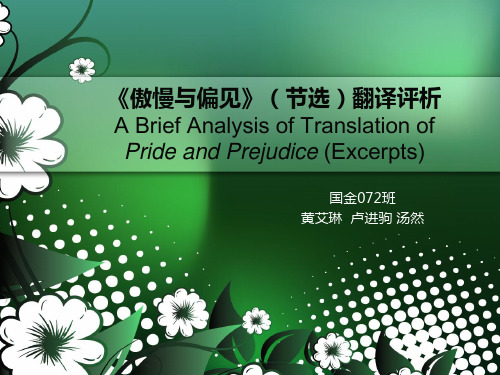
Translation of Pride and Prejudice
翻译评析
翻译评析
• …the true philosopher will derive benefit from such as are given. Elizabeth, however, had never been V1.不过,伊丽莎白并不是看不 • 出父亲这方面的缺德。(王科一 Impropriety 译) [OALED] behavior or actions V2. 不过,伊丽莎白并不是看 that are dishonest, morally 不出父亲这样行为的不妥。 wrong or not appropriate for a person in a position of Impropriety的确有缺德的意思, responsibility 不诚实(或不 但在不同句子中的具体含义, 正当、不合适)的行为举止 需要看它们用在谁身上
改译:既然你想告诉我 “Do not you want to know who has taken it?” cried his wife impatiently. Invitation:邀请—鼓励(引申
“You want to tell me, and I have no objection to hearing it.” 义) This was invitation enough. “Why, my dear, you must know, Mrs.改译:这句话足够鼓励她讲下 Long says that Netherfield is 去。 taken by a young man of large fortrune from the north of England; that he came down on Monday on a chaise and four to see the place, and was so much delighted with it that he agreed with Mr. Morris immediately;” “你难道不想知道是谁租去的吗?”太太不耐烦地嚷起来了。
PrideandPrejudice傲慢与偏见中英文双语简介.doc

Pride and PrejudicePride and Prejudice is a novel by Jane Austen, first published in 1813. The story follows the main character Elizabeth Bennet as she deals with issues of manners, upbringing, morality, education, and marriage in the society of the landed gentry of early 19th-century England. Elizabeth is the second of five daughters of a country gentleman living near the fictional town of Meryton in Hertfordshire, near London. Though the story is set at the turn of the 19th century, it retains a fascination for modern readers, continuing near the top of lists of 'most loved books' such as The Big Read.[1] It has become one of the most popular novels in English literature and receives considerable attention from literary scholars. Modern interest in the book has resulted in a number of dramatic adaptations and an abundance of novels and stories imitating Austen's memorable characters or themes. To date, the book has sold some 20 million copies worldwidePlot summaryThe narrative opens with Mr Bingley, a wealthy, charming and social young bachelor, moving into Netherfield Park in the neighbourhood of the Bennet family. Mr Bingley is soon well received, while his friend Mr Darcy makes a less favorable first impression by appearing proud and condescending at a ball that they attend (this is partly explained in that he detests dancing and is not much for light conversation). Mr Bingley singles out Elizabeth's elder sister, Jane, for particular attention, and it soon becomes apparent that they have formed an attachment to each other. By contrast, Darcy slights Elizabeth, who overhears and jokes about it despite feeling a budding resentment.On paying a visit to Mr Bingley's sister, Jane is caught in a heavy downpour, catches cold, and is forced to stay at Netherfield for several days. Elizabeth arrives to nurse her sister and is thrown into frequent company with Mr Darcy, who begins to perceive his attachment to her, but is too proud to proceed on this feeling.Mr Collins, a clergyman, pays a visit to the Bennets. MrBennet and Elizabeth are much amused by his obsequious veneration of his employer, the noble Lady Catherine de Bourgh, as well as by his self-important and pedantic nature. It soon becomes apparent that Mr Collins has come to Longbourn to choose a wife from among the Bennet sisters (his cousins) and Elizabeth has been singled out. At the same time, Elizabeth forms an acquaintance with Mr Wickham, a militia officer who claims to have been very seriously mistreated by Mr Darcy, despite having been a ward of Mr Darcy's father. This tale, and Elizabeth's attraction to Mr Wickham, adds fuel to her dislike of Mr Darcy.At a ball given by Mr Bingley at Netherfield, Mr Darcy becomes aware of a general expectation that Mr Bingley and Jane will marry, and the Bennet family, with theexception of Jane and Elizabeth, make a public display of poor manners and decorum. The following morning, Mr Collins proposes marriage to Elizabeth, who refuses him, much to her mother's distress. Mr Collins recovers and promptly becomes engaged to Elizabeth's close friend Charlotte, a homely woman with few prospects. Mr Bingley abruptly quits Netherfield and returns to London, and Elizabeth is convinced that Mr Darcy and Mr Bingley's sister have conspired to separate him from Jane.In the spring, Elizabeth visits Charlotte and Mr Collins in Kent. Elizabeth and her hosts are frequently invited to Rosings Park, home of Lady Catherine de Bourgh, Darcy's aunt; coincidentally, Darcy also arrives to visit. Darcy again finds himself attracted to Elizabeth and impetuously proposes to her. Elizabeth, however, has just learned of Darcy's role in separating Mr Bingley from Jane from his cousin Colonel Fitzwilliam. She angrily rebukes him, and a heated discussion follows; she charges him with destroying her sister's happiness, with treating Mr Wickham disgracefully, and with having conducted himself towards her in an ungentleman-like manner. Mr Darcy, shocked, ultimately responds with a letter giving a good account of (most of) his actions: Wickham had exchanged his legacies for a cash payment, only to return after gambling away the money to reclaim the forfeited inheritance; he then attempted to elope with Darcy's young sister, thereby to capture her fortune. Regarding Mr Bingley and Jane, Darcy claimed he had observed no reciprocal interest in Jane for Bingley. Elizabeth later came to acknowledge the truth of Darcy's assertions.Some months later, Elizabeth and her Aunt and Uncle Gardiner visit Pemberley, Darcy's estate, believing he will be absent for the day. He returns unexpectedly, and though surprised, he is gracious and welcoming. He treats the Gardiners with great civility; he introduces Elizabeth to his sister, and Elizabeth begins to realise her attraction to him. Their reacquaintance is cut short, however, by news that Lydia, Elizabeth's sister, has run away to elope with Mr Wickham. Elizabeth and the Gardiners return to Longbourn, where Elizabeth grieves that her renewed acquaintance with Mr Darcy will end because of her sister's disgrace.Lydia and Wickham are soon found, then married by the clergy; they visit Longbourn, where Lydia lets slip that Mr Darcy was responsible for finding the couple and negotiating their marriage—at great expense to himself. Elizabeth is shocked but does not dwell further on the topic due to Mr Bingley's return and subsequent proposal to Jane, who immediately accepts.Lady Catherine de Bourgh later bursts in on Longbourn; intending to thwart local rumour, she warns Elizabeth against marrying Mr Darcy. Elizabeth refuses her demands. Disgusted, Lady Catherine leaves and drops by to inform her nephew on Elizabeth's abominable behaviour. However, this lends hope to Darcy that Elizabeth's opinion of him may have changed. He travels to Longbourn and proposes again; and now Elizabeth accepts.Major themesMany critics take the novel's title as a starting point when analysing the major themes of Pride and Prejudice; however, Robert Fox cautions against reading too much into the title because commercial factors may have played a role in its selection. "After the success of Sense and Sensibility, nothing would have seemed more natural than to bring out another novel of the same author using again the formula of antithesis and alliteration for the title. It should be pointed out that the qualities of the title are not exclusively assigned to one or the other of the protagonists; both Elizabeth and Darcy display pride and prejudice."[5]A major theme in much of Austen's work is the importance of environment and upbringing on the development of young people's character and morality.[6] Social standing and wealth are not necessarily advantages in her world, and a further theme common to Jane Austen's work is ineffectual parents. In Pride and Prejudice, the failure of Mr and MrsBennet as parents is blamed for Lydia's lack of moral judgment; Darcy, on the other hand, has been taught to be principled and scrupulously honourable, but he is also proud and overbearing.[6] Kitty, rescued from Lydia's bad influence and spending more time with her older sisters after they marry, is said to improve greatly in their superior society内容简介说故事最主要是围绕着18世纪末19世纪初,英国地主乡绅贵族的求爱和婚姻问题。
《傲慢与偏见》原文及译文
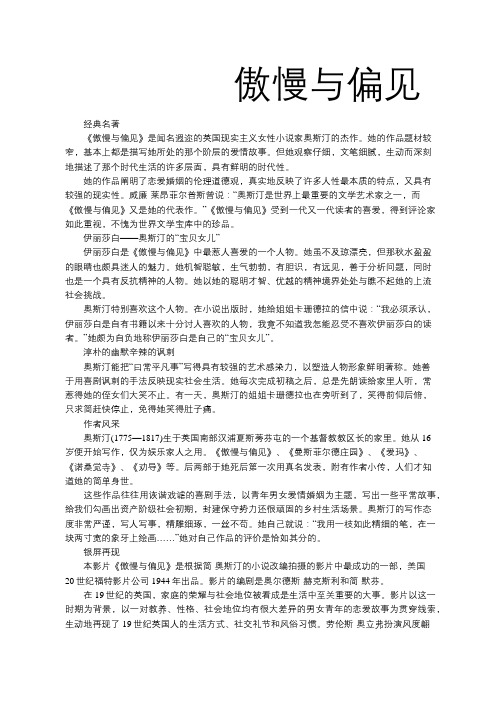
傲慢与偏见经典名著《傲慢与偏见》是闻名遐迩的英国现实主义女性小说家奥斯汀的杰作。
她的作品题材较窄,基本上都是描写她所处的那个阶层的爱情故事。
但她观察仔细,文笔细腻,生动而深刻地描述了那个时代生活的许多层面,具有鲜明的时代性。
她的作品阐明了恋爱婚姻的伦理道德观,真实地反映了许多人性最本质的特点,又具有较强的现实性。
威廉·莱昂菲尔普斯曾说:“奥斯汀是世界上最重要的文学艺术家之一,而《傲慢与偏见》又是她的代表作。
”《傲慢与偏见》受到一代又一代读者的喜爱,得到评论家如此重视,不愧为世界文学宝库中的珍品。
伊丽莎白——奥斯汀的“宝贝女儿”伊丽莎白是《傲慢与偏见》中最惹人喜爱的一个人物。
她虽不及琼漂亮,但那秋水盈盈的眼睛也颇具迷人的魅力。
她机智聪敏,生气勃勃,有胆识,有远见,善于分析问题,同时也是一个具有反抗精神的人物。
她以她的聪明才智、优越的精神境界处处与瞧不起她的上流社会挑战。
奥斯汀特别喜欢这个人物。
在小说出版时,她给姐姐卡珊德拉的信中说:“我必须承认,伊丽莎白是自有书籍以来十分讨人喜欢的人物,我竟不知道我怎能忍受不喜欢伊丽莎白的读者。
”她颇为自负地称伊丽莎白是自己的“宝贝女儿”。
淳朴的幽默辛辣的讽刺奥斯汀能把“曰常平凡事”写得具有较强的艺术感染力,以塑造人物形象鲜明著称。
她善于用喜剧讽刺的手法反映现实社会生活。
她每次完成初稿之后,总是先朗读给家里人听,常惹得她的侄女们大笑不止。
有一天,奥斯汀的姐姐卡珊德拉也在旁听到了,笑得前仰后俯,只求简赶快停止,免得她笑得肚子痛。
作者风采奥斯汀(1775—1817)生于英国南部汉浦夏斯蒡芬屯的一个基督教教区长的家里。
她从16岁便开始写作,仅为娱乐家人之用。
《傲慢与偏见》、《曼斯菲尔德庄园》、《爱玛》、《诺桑觉寺》、《劝导》等。
后两部于她死后第一次用真名发表,附有作者小传,人们才知道她的简单身世。
这些作品往往用诙谐戏谑的喜剧手法,以青年男女爱情婚姻为主题,写出一些平常故事,给我们勾画出资产阶级社会初期,封建保守势力还很顽固的乡村生活场景。
傲慢与偏见-Pride-and-Prejudice-中英文剧本
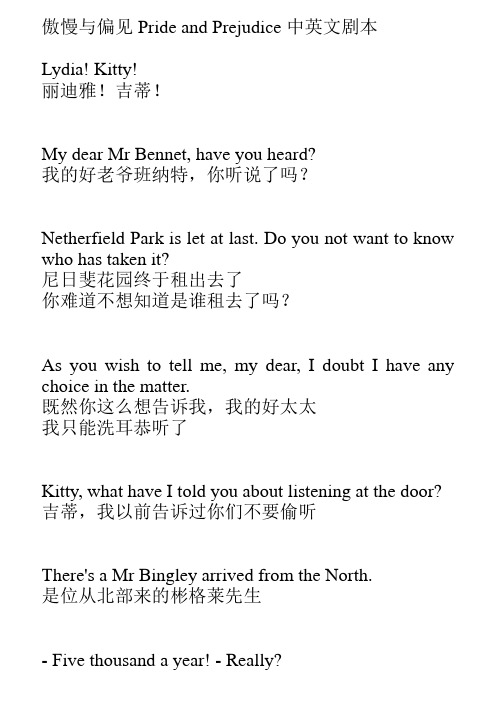
傲慢与偏见 Pride and Prejudice 中英文剧本Lydia! Kitty!丽迪雅!吉蒂!My dear Mr Bennet, have you heard?我的好老爷班纳特,你听说了吗?Netherfield Park is let at last. Do you not want to know who has taken it?尼日斐花园终于租出去了你难道不想知道是谁租去了吗?As you wish to tell me, my dear, I doubt I have any choice in the matter.既然你这么想告诉我,我的好太太我只能洗耳恭听了Kitty, what have I told you about listening at the door? 吉蒂,我以前告诉过你们不要偷听There's a Mr Bingley arrived from the North.是位从北部来的彬格莱先生- 一年有五千磅的收入! - 真的?- He's single! - Who's single?- 他是单身汉! - 谁是单身汉?A Mr Bingley, apparently. Kitty!彬格莱先生,显然吉蒂!How can that possibly affect them?这关女儿们什么事?Mr Bennet, how can you be so tiresome?班纳特老爷你怎么这样叫人讨厌?You know he must marry one of them.告诉你吧,他一定会娶我们女儿中的一个当太太That is his design in settling here?他住到这儿来就是为了这个打算的吗?You must go and visit him at once.你得马上去拜访拜访他Good heavens. People.天哪,人们For we may not visit if you do not, as you well know, Mr Bennet.要是你不去,叫我们怎么去?你是知道的,班纳特- Are you listening? You never listen. - You must, Papa! At once!- 你在听我说话吗?你从来都不听- 你一定要去,爸爸!马上!There's no need. I already have.没必要去了,我已经去过了- You have? - When?- 你去过了? - 什么时候?Oh, Mr Bennet, how can you tease me so?噢,班纳特老爷你怎么能够这样戏弄我们?Have you no compassion for my poor nerves?你半点儿也不体谅我脆弱的神经You mistake me, my dear. I have the highest respect for them.你错怪我了,我的好太太我非常尊重你的神经They've been my constant companions these twenty years.它们是我23年的老朋友了Papa!爸爸!- Is he amiable? - Who?- 他亲切吗? - 谁?- Is he handsome? - He's sure to be.- 他帅吗? - 他一定帅With 5,000 a year, it would not matter if he had warts. 一年有五千磅的人就算他有什么毛病也没关系啦Who's got warts?谁有毛病?我倒想看看他会娶什么样的女孩- So will he come to the ball tomorrow? - I believe so. - 那么他明天也会去舞会吗? - 我想是的- Mr Bennet! - [Kitty] I have to have your muslin!- 班纳特老爷! - 我要穿你的棉布衣了!- I'll lend you my green slippers! - They were mine.- 我会借给你我的绿拖鞋! - 它们以前是我的- I'll do your mending for a week. - I'll retrim your new bonnet.- 我会为你做一星期的针线活- 我会为你的新帽子重新装饰Two weeks I'll do it for.两周内我将为你做一切[# jig]It's not the same! It's not the same.不一样!不一样I can't breathe.我快呼吸不过来了[girl] I think one of my toes just came off.我想我的一个脚趾头刚失去知觉If every man does not end the evening in love with you, 如果在今晚结束前没有男士爱上你的话then I'm no judge of beauty.那我就再也不对美丽作评论了- Or men. - No, they are far too easy to judge.- 或者男士们 - 不,它们太亲率以至于没有判断力They're not all bad.他们并不都那么糟糕Humourless poppycocks, in my limited experience.在我有限的经历中他们都是没有一点幽默感的胡扯One day, someone will catch your eye,总有一天某人会抓住你的眼睛and then you'll have to watch your tongue.然后你就不得不注意你的口吻了How good of you to come.你能来真太好了Which of the painted peacocks is our Mr Bingley?哪一位鲜艳的孔雀是我们的彬格莱先生?He's on the right. On the left is his sister.右边的是他左边的是他的妹妹- The person with the quizzical brow? - That is his good friend, Mr Darcy.- 长着奇怪眉毛的那个?- 那个是他的好朋友,达西先生- He looks miserable, poor soul. - He may be, but poor he is not.- 他看上去挺痛苦的,可怜的人- 他可能痛苦,但并不可怜Tell me.1 0,000 a year, and he owns half of Derbyshire.一年有一万英镑的收入他拥有半个的德贝郡The miserable half.这个痛苦的半个德贝郡[# jig]Mr Bennet, you must introduce him to the girls immediately.班纳特老爷,你一定要马上把他介绍给你的女儿们Smile at Mr Bingley. Smile.朝彬格莱先生微笑,微笑Mary.曼丽Mr Bingley, my eldest daughter you know.彬格莱先生,我的长女,你已经认识Mrs Bennet, Miss Jane Bennet, Elizabeth and Miss班纳特太太,吉英·班纳特小姐伊丽莎白还有曼丽·班纳特小姐It is a pleasure. I have two others, but they're already dancing.很荣幸见到你们我还有两个女儿,但是她们在跳舞I'm delighted to make your acquaintance.我很高兴能与你们相识And may I introduce Mr Darcy of Pemberley in Derbyshire.请允许我向你们介绍达西先生来自德贝郡的彭布利庄园How do you like it here in Hertfordshire?你喜欢赫特福德郡吗?Very much.很喜欢The library at Netherfield, I've heard, is one of the finest.尼日斐的图书馆我听说是最好的图书馆之一It fills me with guilt. I'm not a good reader. I prefer being out of doors.这真让我深感内疚我不是一个好的读者,我跟喜欢户外运动Oh, I mean, I can read, of course.噢,我是说,我能阅读,当然And I'm not suggesting you can't read out of doors.我不建议你这么做在户外是没法阅读的[Jane] I wish I read more, but there seem to be so many other things to do.我非常希望我能多读点书但是总有这样那样的事情要做[Bingley] That's exactly what I meant.就是那个意思Mama, Mama! You will never, ever believe what we're about to tell you.妈妈,妈妈!你肯定不会相信我们要告诉你的事情- 告诉我! - 她一定会掩饰- The regiment are coming! - Officers?- 军团来了! - 军官们?They're going to be stationed the whole winter, right here.他们整个冬天将驻扎在这里,在这里!- Officers? - As far as the eye can see.- 军官们? - 就在我们附近[Mrs Bennet] Oh, look. Jane's dancing with Mr Bingley. 噢,瞧,吉英在和彬莱格先生在跳舞Mr Bennet.班纳特老爷- Do you dance, Mr Darcy? - Not if I can help it.- 你跳舞吗,达西先生?- 不,但是如果你想跳得话我可以带你跳I didn't know you were coming to see me. What's the我不知道你会来这看我出什么事了?We are a long way from Grosvenor Square, are we not, Mr Darcy?我们从罗夫纳酒店千里迢迢赶来的就为这?达西先生?I've never seen so many pretty girls.我生平没见过今天晚上这么多可爱的姑娘们You were dancing with the only handsome girl.舞场上唯一漂亮的姑娘跟你在跳舞我从来没见过如此美丽的尤物She is the most beautiful creature I have ever beheld. - But her sister Elizabeth is agreeable. - Perfectly tolerable.- 但是她的妹妹伊丽莎白也很讨人喜欢阿 - 她还可以Not handsome enough to tempt me. Return to your partner and enjoy her smiles.但是还没漂亮到打动我的心你还是回到你的舞伴身边去欣赏她的笑脸吧[Darcy] You're wasting your time with me.犯不着把时间浪费在我的身上Count your blessings, Lizzie. If he liked you, you'd have to talk to him.上帝保佑你,伊丽莎白如果他喜欢你,你就要和他说说话Precisely.正好I wouldn't dance with him for all of Derbyshire,我可不愿意当着所有德贝郡的人面和他跳舞Iet alone the miserable half.让这个痛苦的半个德贝郡一个人呆着吧[# jig]Wait!等等!- I enjoyed that so much, Miss Lucas. - How well you- 我很喜欢这里,卢卡斯小姐- 你跳的真好,彬莱格先生[woman] I've never enjoyed a dance so much.我从没这么快乐的跳舞过My daughter Jane is a splendid dancer, is she not?我女儿吉英的舞跳得很不错,对吧?She is indeed.她确实跳得很好Your friend Miss Lucas is a most amusing young woman.你的朋友卢卡斯小姐是一个非常风趣的年轻女士Oh, yes, I adore her.噢,是的,我很崇拜她- It is a pity she's not more handsome. - Mama!- 可惜的是她不够漂亮 - 妈妈!Oh, but Lizzie would never admit that she's plain.Of course, it's my Jane who's considered the beauty of the county.当然啦,我的吉英才是这个郡最漂亮的可人儿Mama, please!妈妈,求求你!When she was 1 5, a gentleman was so much in love with her,当她还只有15岁的时候一位绅士就深深地爱上她了I was sure he would make her an offer.我敢肯定他一定对她有企图However, he did write her some very pretty verses.无论如何,他是写过不少可爱的诗给她And that put paid to it.但就那样结束了I wonder who discovered the power of poetry in driving away love.- I thought poetry was the food of love. - Of a fine, stout love.- 我想诗是爱情之花的露水 - 多美啊,如磐石的爱情But if it is only a vague inclination, one poor sonnet will kill it.但是如果只是暧昧的喜好一首乏味的十四行诗会毁了它So, what do you recommend to encourage affection?那么,你推荐用什么来鼓励爱情呢?Dancing. Even if one's partner is barely tolerable.跳舞,即使舞伴长得只是可以[hushed] Mr Bingley is just what a young man ought to be.彬莱格先生真是位典型的好青年- Sensible, good-humoured... - Handsome, conveniently rich...- 有见识,有趣味.. - 英俊,非常富有...Marriage should not be driven by thoughts of money.婚姻不应该被金钱的贪婪驱使Only deep love will persuade me to marry.只有真挚的爱情才能让我结婚- Which is why I'll end up an old maid. - Do you really believe he liked me?- 这就是为什么我终将会成为一位老姑娘- 你真的认为他喜欢我吗?He danced with you most of the night, and stared at you the rest.他几乎整晚都在和你跳舞即使你在休息时,眼睛也一刻不离开你I give you leave to like him. You've liked many stupider. 我不反对你喜欢他不过你以前也喜欢过很多蠢货啊You're a great deal too apt to like people in general.你总是太容易发生好感All the world is good in your eyes.在你眼睛里看到,天下都是好人你都看得顺眼Not his friend. I still can't believe what he said about you.但不包括达西先生我到现在都不敢相信他评论的你的那些话达西先生?Mr Darcy?I'd more easily forgive his vanity had he not wounded mine.我会更容易原谅他的空虚那些不会伤害我But no matter. I doubt we shall ever speak again.但是不用担心恐怕我们再也不会说话了[Mrs Bennet] He danced with Miss Lucas.他和卢卡斯小姐跳舞了[Mr Bennet] We were all there, dear.我们都在那看到了,我的好太太。
- 1、下载文档前请自行甄别文档内容的完整性,平台不提供额外的编辑、内容补充、找答案等附加服务。
- 2、"仅部分预览"的文档,不可在线预览部分如存在完整性等问题,可反馈申请退款(可完整预览的文档不适用该条件!)。
- 3、如文档侵犯您的权益,请联系客服反馈,我们会尽快为您处理(人工客服工作时间:9:00-18:30)。
英汉双语版《傲慢与偏见》第十一章节选
Mrs Bennet was quite depressed when Lydia and Wickham left Longbourn to travel north to Newcastle. But soon Mrs Philips brought the happy news that Mr Bingley was expected to return to Netherfield in a day or two, and Mrs Bennet became very excited. She made preparations to invite him to dinner, and counted the days that must pass before she could send the invitation.
丽迪亚和韦翰离开浪搏恩北上纽卡斯尔,这使班纳特太太相当丧气。
但不久菲力普斯太太带来了好消息,说彬格莱先生可望于一两天内返回尼日斐,班纳特太太激动万分。
她开始为邀请他吃饭作准备,并且盘算着再过几天就可以发送请帖了。
解析:depressed 沮丧的、萧条的
eg: What do you do when you feel really low and depressed?
当你觉得十分低沉和沮丧的时候会做什么?
However, on only the third morning after his arrival, she caught sight of him from her bedroom window, riding towards Longbourn House, with another gentleman, also on horseback.
但是,就在彬格莱到达后的第三天上午,她就从卧室的窗户中看到了他骑着马向浪搏恩府走来,同行的还有一位先生,也骑着马。
解析:catch sight of 看到、发现、感觉到
If you ever catch sight of Ted anywhere, call the police.
你要是在任何地方看到得泰德,就去报警。
'Girls! Quickly!' she cried. 'Mr Bingley is coming! And who's that with him? It must be Mr Darcy, that tall, proud man. Well, as he is Mr Bingley's friend, we must be polite to him, but I must say, I hate the sight of him.'
“姑娘们!快点儿!”她喊道。
“彬格莱先生来了!跟他一起来的是谁?一定是达西先生,那个高个子、傲慢的人。
哎呀,他既然是彬格莱先生的朋友,我们也要客气点儿,可是,我得承认,我不喜欢见到他。
”
Both Jane and Elizabeth felt uncomfortable, and sympathized with each other. Jane was nervous about meeting Bingley again, and determined not to show her feelings. Elizabeth was uneasy at the thought of seeing Darcy, as she was the only one who knew how much the whole family owed him, in spite of their general dislike of him. She was astonished that he had come to see her, and for a moment she allowed herself to hope that his affection and wishes might still be the same.
简和伊丽莎白都感到很不自在,两人同病相怜。
又要见到彬格莱,简感到惴惴不安,决心不表露自己的感情。
伊丽莎白一想到要见达西了,就感到很尴尬,因为就她一个人知道全家欠人家多少情,尽管大家都讨厌人家。
他来看她,使她很惊奇,有那么一会儿,她大胆地希望他仍旧未改初衷。
解析:uncomfortable 不舒服的、不安的
eg:There was an uncomfortable silence in classroom.
教室里有一种令人不安的安静。
determine 决定、下决心
eg:He determined that he would travel to New York this summer holiday. 他决定今年暑假将旅行到纽约。
